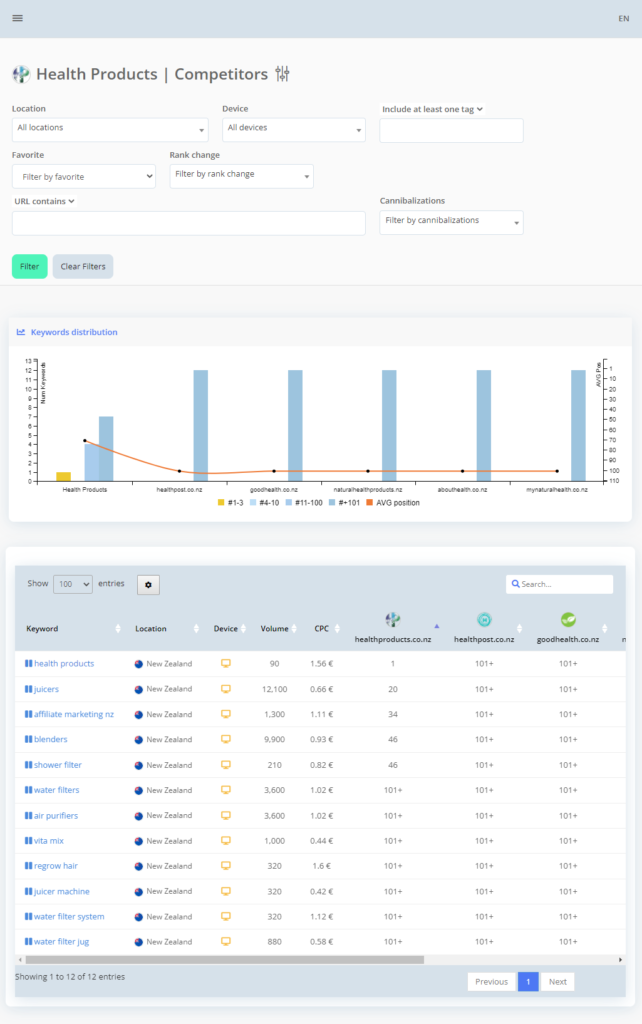In the dynamic world of digital marketing, understanding your competitors is crucial for developing effective SEO strategies. Competitor analysis is not just about knowing who your rivals are; it's about digging deep into their ranking strategies, keywords, and content to determine how you can outperform them. This analytical approach can help you identify gaps in your strategy and uncover opportunities for growth. Whether you're a seasoned marketer or a business owner looking to enhance online visibility, grasping the concept of SEO competitors ranking is essential.
As the online landscape continues to evolve, the competition becomes fiercer. With countless businesses vying for the same audience, it’s vital to keep a finger on the pulse of your competitors’ performance. The process involves not just tracking their rankings but understanding the factors that contribute to their success. By leveraging tools and techniques to analyze SEO competitors ranking, you can create a more informed strategy that drives traffic and boosts conversions.
Moreover, SEO competitors ranking analysis can provide insights into the effectiveness of your own SEO efforts. By comparing your performance with that of your competitors, you can identify strengths and weaknesses in your strategy. This knowledge empowers you to make data-driven decisions that can enhance your website's visibility and authority in search engine results pages (SERPs).
Read also:Unveiling The Educational Brilliance Of Shady Side Academy
What is SEO Competitors Ranking?
SEO competitors ranking refers to the position of your competitors' websites in search engine results compared to your own. It involves analyzing various metrics, such as keyword rankings, domain authority, and backlinks, to understand how well competitors are performing in organic search. This analysis can help businesses determine where they stand in relation to their competitors and identify areas for improvement.
Why is Analyzing SEO Competitors Ranking Important?
Analyzing SEO competitors ranking is vital for several reasons:
- Identifying Market Gaps: By understanding what your competitors are doing well, you can uncover gaps in your own strategy.
- Keyword Discovery: Competitor analysis can reveal new keywords to target that you may not have considered.
- Content Strategy Improvement: Analyzing competitors’ content can inspire new ideas and help refine your own content strategy.
- Benchmarking Performance: Knowing your competitors’ rankings allows you to set realistic goals and measure your own performance.
How to Conduct SEO Competitors Ranking Analysis?
Conducting an SEO competitors ranking analysis involves several steps:
- Identify Your Competitors: List out direct and indirect competitors in your niche.
- Use SEO Tools: Employ tools like SEMrush, Ahrefs, or Moz to gather data on competitors’ rankings.
- Analyze Keywords: Look at the keywords your competitors are ranking for and assess their relevance to your business.
- Evaluate Content Quality: Review the type of content that ranks well for your competitors.
- Assess Backlink Profiles: Analyze the quality and quantity of backlinks pointing to your competitors’ sites.
What Tools are Available for SEO Competitors Ranking Analysis?
Numerous tools can assist in analyzing SEO competitors ranking. Some of the most popular ones include:
- SEMrush: A comprehensive tool that provides insights into keywords, traffic, and competitor strategies.
- Ahrefs: Known for its backlink analysis, Ahrefs also offers keyword tracking and content exploration features.
- Moz: Offers tools for keyword research, site audits, and tracking your competitors’ SEO performance.
- SpyFu: Focuses on competitor keyword research and PPC analysis.
How Can You Use SEO Competitors Ranking to Improve Your Strategy?
Understanding SEO competitors ranking can significantly impact your SEO strategy:
- Optimize Your Content: Use insights from your competitors to create high-quality, relevant content that addresses user needs.
- Target New Keywords: Leverage keyword research from competitors to expand your target keywords list.
- Build Backlinks: Identify backlink opportunities that your competitors are utilizing to enhance your own backlink profile.
- Adjust Your SEO Tactics: Be flexible in adapting your strategies based on competitor analysis findings.
What Challenges Might You Face When Analyzing SEO Competitors Ranking?
While analyzing SEO competitors ranking can be beneficial, it comes with its challenges:
Read also:Insights Into Textron Aviation The Pinnacle Of Aircraft Innovation
- Data Overload: The abundance of data can be overwhelming and may lead to analysis paralysis.
- Changing Algorithms: Search engine algorithms frequently change, affecting rankings and making it tough to keep up.
- Competitor Secrecy: Some competitors may employ strategies that are difficult to analyze or replicate.
Conclusion: Maximizing Your SEO Competitors Ranking Insights
In conclusion, understanding SEO competitors ranking is a powerful tool in enhancing your digital marketing strategy. By conducting thorough analysis and leveraging the right tools, you can gain valuable insights into your competitors’ performance and identify opportunities for growth. Remember to stay adaptable, as the online landscape is ever-changing, and continuous monitoring is key to staying ahead in the competitive SEO game.


